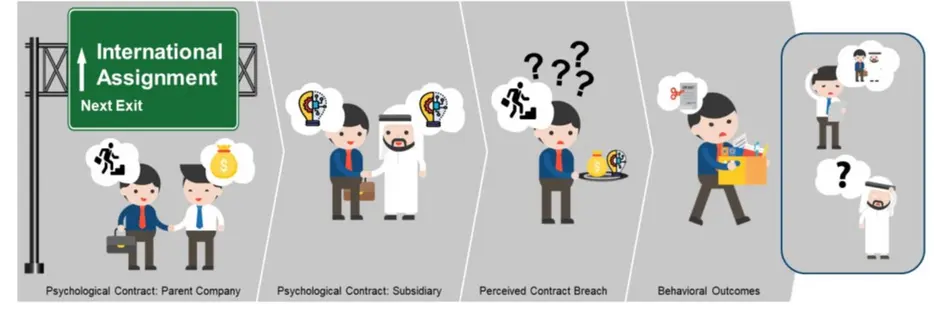What happens abroad stays abroad? Expatriates’ Psychological Contracts during International Assignments

Project Description
Expatriates play a crucial role for international companies as they are an indispensable element for entering foreign markets, implementing strategies, and facilitating cross-border knowledge transfer. However, managing expatriate assignments is one of the most challenging and costly HR activities. One of these challenges is appropriate expectation management through functional psychological contracts, a topic that is increasingly coming into focus in psychological contract research at the international level. Psychological contracts (PCs) of expatriates are, however, more complex than those of employees in a national context, as expatriates simultaneously fulfill roles for two organizational units – the parent company and the foreign subsidiary. As a result, they form two PCs and either the parent company or the subsidiary, or both, can be responsible for breaching the expatriate’s PC.
Even though the severe effects of PCs in single-agency settings have been the subject of considerable research, their effects are largely unknown in multiple-agency settings. Existing conceptualizations of PCs fall short of adequately explaining the complexity of multiple-agency PCs during expatriate assignments, as key differences are largely overlooked: for example, the possibility of negative emotions and behaviors in the event of a contract breach being shifted onto a party that is not responsible for the breach. These spillover effects onto "innocent" parties challenge our understanding of PCs and the underlying assumptions of reciprocity, showing that we can only inadequately explain when and why such shifts occur.
Project Goals
This project addresses this central research gap and aims to explore the fundamental theoretical mechanisms of spillover effects in the context of psychological contracts of expatriates from a multiple-ageny perspective.
From this overarching goal, several sub-goals arise:
- Exploring the formation process of expatriates’ PCs to disentangle expatriates’ expectations toward the parent company and the subsidiary.
- Exploring key conditions that cause spillover effects.
- Analyzing the influence of parent and subsidiary company that can lead to a buffering of spillover effects.
Applied Methods
To achieve the research goals, the project employs a mixed-methods approach, in which qualitative (interviews) and quantitative data (surveys, experiments) are collected and analyzed. By extending psychological contract theory to include indirect reciprocity mechanisms, the fundamental mechanisms of spillover effects in the context of psychological contract breaches of expatriates are thus explored.
